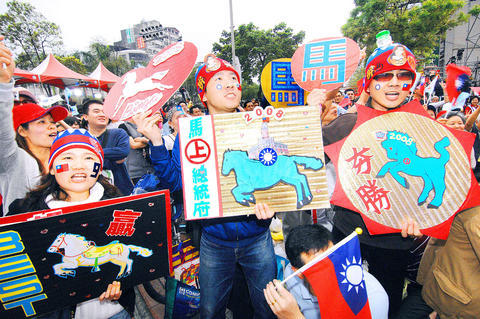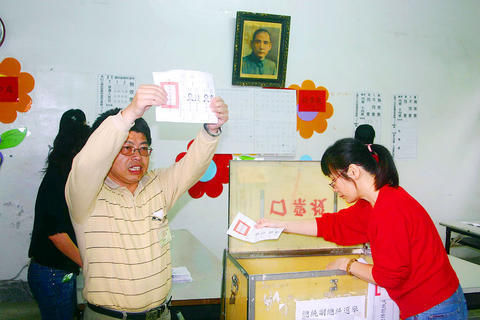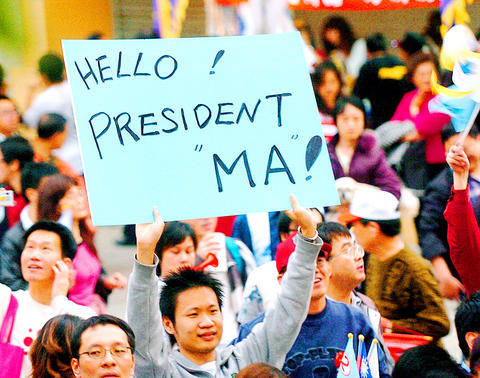Chinese Nationalist Party (KMT) presidential candidate Ma Ying-jeou (馬英九) won an emphatic victory over his Democratic Progressive Party (DPP) rival in yesterday's presidential poll, regaining power for the first time since the DPP ended the KMT's rule eight years ago.
Ma's victory gave the KMT control of both the executive and legislative branches of government after the party claimed more than two-thirds of the seats in January's legislative elections.
Ma's camp declared victory at 6pm, two hours after the voting booths closed -- with Ma beating Frank Hsieh (

PHOTO: SAM YEH, AFP
Tens of thousands of supporters greeted the announcement with shouts of Ma Ying-jeou dong suan, which means "Ma Ying-jeou elected" in Taiwanese.
Ma appeared on stage in front of KMT headquarters at 7:30pm in front of excited supporters who set off air horns and shouted "President Ma."
"The election result is not a Ma-Siew team victory, neither is it a victory for the KMT. It's a victory for all Taiwanese," Ma said.

PHOTO : CHANG HSUN-TENG, TAIPEI TIMES
"We will move forward with gratitude and act on our promises humbly. We will govern the country in accordance with the people's wishes and make reforms," he said.
In his victory speech, Ma promised to turn his campaign promises into policies and carry them out over the next four years.
"The end of the election is the beginning of commitment and change. Only change will bring hope and only change will give people opportunities," he said.

PHOTO : FANG PIN-CHAO, TAIPEI TIMES
Ma thanked Hsieh and his running mate, Su Tseng-chang (
"We will never forget the DPP's contribution to Taiwan's democracy and we should all feel proud of Taiwan's democracy and freedom as shown by today's election," Ma said.
Ma promised to seek to cooperate with the DPP and implement 19 policies proposed by Hsieh during his campaign.
Ma was surrounded by National Security Bureau agents as he delivered his speech from behind bullet-proof glass.
On stage about 10 minutes before Ma, KMT vice presidential candidate Vincent Siew (蕭萬長) promised to put his economic policies into practice to revive the nation's economy.
"The Ma-Siew team is ready to serve the people and fight for all Taiwanese. We will adhere to a `Taiwan-centric' vision for the next four years and defend the nation's interests," Siew said.
He vowed to serve as a competent vice president and to assist Ma in implementing their policies.
Former KMT chairman Lien Chan (
Lien said he expected the KMT to build a harmonious and prosperous nation.
KMT Chairman Wu Poh-hsiung (吳伯雄) led party officials in a bow to the public, vowing to implement clean and effective government. He said he expected a stern examination of the KMT by the public now that it was the ruling party again.
"I can reassure all Taiwanese that there will be no one-party dominance. The people are the masters and the KMT is determined to meet the people's expectations," Wu said.
After he was joined onstage by People First Party (PFP) Chairman James Soong (
Wu said the parties had been discussing a merger for a long time and now the time was ripe.
Legislative Speaker Wang Jin-pyng (
"One-party governance would only make the Legislative Yuan more humble," Wang said.
"We will respect other parties' opinions and will not ignore our responsibility to examine the way we govern," he said.

The Coast Guard Administration (CGA) yesterday said it had deployed patrol vessels to expel a China Coast Guard ship and a Chinese fishing boat near Pratas Island (Dongsha Island, 東沙群島) in the South China Sea. The China Coast Guard vessel was 28 nautical miles (52km) northeast of Pratas at 6:15am on Thursday, approaching the island’s restricted waters, which extend 24 nautical miles from its shoreline, the CGA’s Dongsha-Nansha Branch said in a statement. The Tainan, a 2,000-tonne cutter, was deployed by the CGA to shadow the Chinese ship, which left the area at 2:39pm on Friday, the statement said. At 6:31pm on Friday,

The Chinese People’s Liberation Army Navy’s (PLAN) third aircraft carrier, the Fujian, would pose a steep challenge to Taiwan’s ability to defend itself against a full-scale invasion, a defense expert said yesterday. Institute of National Defense and Security Research analyst Chieh Chung (揭仲) made the comment hours after the PLAN confirmed the carrier recently passed through the Taiwan Strait to conduct “scientific research tests and training missions” in the South China Sea. China has two carriers in operation — the Liaoning and the Shandong — with the Fujian undergoing sea trials. Although the PLAN needs time to train the Fujian’s air wing and

The American Institute in Taiwan (AIT) put Taiwan in danger, Ma Ying-jeou Foundation director Hsiao Hsu-tsen (蕭旭岑) said yesterday, hours after the de facto US embassy said that Beijing had misinterpreted World War II-era documents to isolate Taiwan. The AIT’s comments harmed the Republic of China’s (ROC) national interests and contradicted a part of the “six assurances” stipulating that the US would not change its official position on Taiwan’s sovereignty, Hsiao said. The “six assurances,” which were given by then-US president Ronald Reagan to Taiwan in 1982, say that Washington would not set a date for ending arm sales to Taiwan, consult

A Taiwanese academic yesterday said that Chinese Ambassador to Denmark Wang Xuefeng (王雪峰) disrespected Denmark and Japan when he earlier this year allegedly asked Japan’s embassy to make Taiwan’s representatives leave an event in Copenhagen. The Danish-language Berlingske on Sunday reported the incident in an article with the headline “The emperor’s birthday ended in drama in Copenhagen: More conflict may be on the way between Denmark and China.” It said that on Feb. 26, the Japanese embassy in Denmark held an event for Japanese Emperor Naruhito’s birthday, with about 200 guests in attendance, including representatives from Taiwan. After addressing the Japanese hosts, Wang